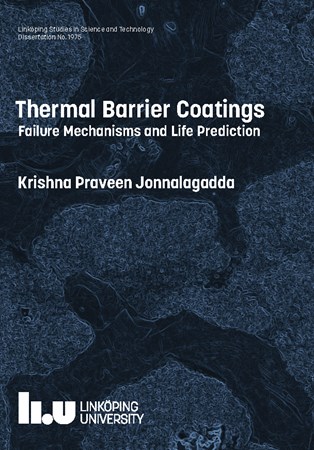Siemens factory in Finspång. Photo credit. Siemens
New materials and methods
Thermal barrier coatings (TBCs) make it possible to use higher temperatures – sometimes as high as 1,600 degrees Celsius – in the hot sections of a gas turbine engine. This gives higher efficiency and, in the long term, a lower impact on the environment. The materials commonly used for TBCs, however, exhibit certain limitations with respect to reaching the highest possible temperatures.
During the use of the coatings, they experience stress in the turbine and eventually fail: two important processes that contribute to this are oxidation and corrosion. This is particularly the case if the turbines are often started and stopped, as is becoming evermore common in order to compensate for cyclical variations in solar energy and wind power, and to balance the electrical supply to the grid.
In his thesis, Thermal Barrier Coatings – Failure Mechanisms during Corrosion, Oxidation and Life Modelling, Krishna Praveen Jonnalagadda compares the performance of new TBC materials and materials manufactured by new methods with that of older types of surface coating.
Many different combinations
“It is mainly the combination of materials and method that is important. Many different combinations are available, and my research demonstrates how well, or how poorly, they work”, says Krishna Praveen Jonnalagadda.
The research has been carried out in collaboration with Siemens Industrial Turbomachinery, one of the world’s leading manufacturers of gas turbines. The results make it clear that a relatively new and promising manufacturing method known as the suspension plasma spray (SPS) technique gives coatings with markedly better properties than the older and cheaper atmospheric plasma spray (APS) technique.
Several tests have been carried out to measure the resistance to corrosion of barrier coatings from the SPS and APS techniques. One result is that thin and dense coatings resist corrosion better than thick and porous ones.
“The SPS technique is promising, but there’s a long way to go before our research results can be applied in practice. It may be possible to implement the method within 5-10 years, if the industry decides that it is a good idea. My thesis is in any case a step along the pathway.”
Faster and less expensive
Krishna Praveen Jonnalagadda. Photo credit: Mikael Sönne
Krishna Praveen Jonnalagadda has also developed a model to calculate the lifetime of different thermal barrier coatings. The model considers thermal cycling (which occurs when the coating experiences high and low temperatures alternately), and can predict the onset of fatigue in barrier coatings with high accuracy. The calculations are sufficiently simple for practical use in the industry.
“The model saves both time and money compared with carrying out all of the tests individually”, he says.
Krishna Praveen Jonnalagadda successfully defended his thesis on 13 March, where John R. Nicholls, professor at Cranfield University, was opponent at the thesis defence. Principal supervisor has been Professor Ru Lin Peng.
